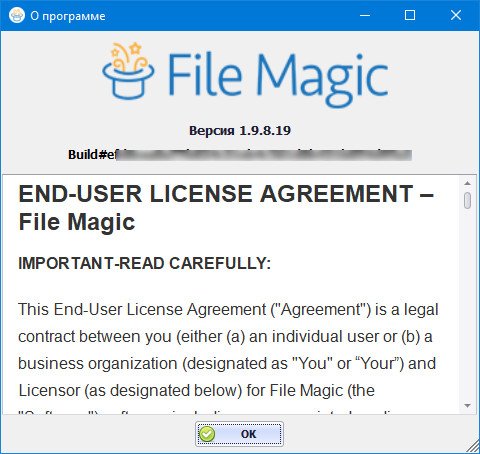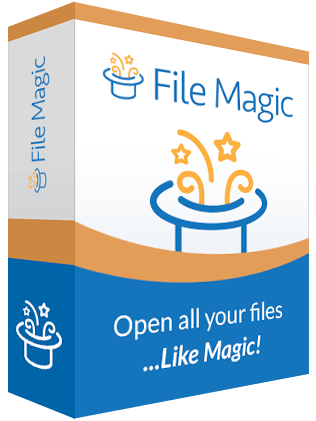 FileMagic is a powerful and user-friendly file management software designed to simplify the process of opening, viewing, and managing a wide variety of file types, including QDA files. In today’s digital world, users frequently encounter file formats that are not natively supported by their operating systems, leading to frustration and inefficiencies. FileMagic eliminates these challenges by offering a seamless, all-in-one solution that allows users to access multiple file types without the need for additional software. Whether handling documents, multimedia files, compressed archives, or research data files like QDA, FileMagic ensures that users can open, examine, and manage their files with ease.
FileMagic is a powerful and user-friendly file management software designed to simplify the process of opening, viewing, and managing a wide variety of file types, including QDA files. In today’s digital world, users frequently encounter file formats that are not natively supported by their operating systems, leading to frustration and inefficiencies. FileMagic eliminates these challenges by offering a seamless, all-in-one solution that allows users to access multiple file types without the need for additional software. Whether handling documents, multimedia files, compressed archives, or research data files like QDA, FileMagic ensures that users can open, examine, and manage their files with ease.
QDA files are typically associated with **qualitative data analysis** software, which is used in research fields such as social sciences, marketing, and medical studies. These files contain structured and unstructured data, including interview transcripts, survey responses, research notes, coding categories, and metadata. Researchers, analysts, and academics rely on QDA software to analyze qualitative data, extract meaningful insights, and organize findings. However, accessing QDA files outside of their native software environment can be challenging, as many operating systems do not support them by default. FileMagic provides a valuable solution by allowing users to open and examine QDA files without requiring specialized qualitative data analysis software, making research data more accessible and manageable.
When users open a QDA file with FileMagic, they are presented with a structured and intuitive interface that allows them to navigate the file’s contents easily. Unlike generic file viewers that may not display QDA files correctly, FileMagic ensures that the data is presented in an organized manner, making it easier for researchers to review qualitative findings. Users can browse interview transcripts, coding structures, and annotations without needing access to the original software used to create the file. This functionality is particularly useful for researchers collaborating across different institutions, where not all team members may have access to the same QDA software. FileMagic provides a convenient way to share and review qualitative research data without compatibility barriers.
For qualitative researchers and academics, FileMagic serves as an essential tool for examining QDA files in different contexts. Many research projects involve collaborative efforts where data is shared between teams using different software applications. FileMagic enables users to open QDA files from various qualitative analysis programs, ensuring that data can be reviewed and interpreted consistently across different platforms. This cross-compatibility is particularly valuable in academic settings, where researchers may need to work with data collected by different institutions or across multiple software tools. By providing a standardized way to access QDA files, FileMagic enhances research collaboration and facilitates better data-sharing practices.
Another important use case for FileMagic is in the field of data preservation and archiving. Many researchers work with QDA files that contain years of valuable data, including historical interviews, policy research, and long-term case studies. However, as software evolves, older QDA file formats may become obsolete or unsupported. FileMagic ensures that these files remain accessible, allowing users to open and view archived QDA files without needing the original software. This feature is crucial for institutions that maintain extensive qualitative research archives, as it prevents data loss and ensures that valuable research remains accessible for future analysis.
Security is a top priority when handling research data, especially when dealing with sensitive qualitative findings. Many QDA files contain confidential information, such as personal interview responses or proprietary market research. FileMagic includes advanced security features that allow users to view QDA files in a read-only mode, preventing accidental modifications or unauthorized edits. Additionally, FileMagic provides options to scan files for integrity and ensure that no unwanted changes have been made to the original dataset. These security measures are particularly valuable for institutions handling ethical research data, ensuring compliance with confidentiality agreements and data protection regulations.
One of the key advantages of FileMagic is its ability to extract and convert data from QDA files into more widely used formats. Many researchers need to export qualitative data into formats such as CSV, TXT, or PDF for further analysis or reporting. FileMagic enables users to extract text, annotations, and metadata from QDA files, making it easier to integrate qualitative findings into other research tools. This functionality is particularly beneficial for researchers who need to present findings to stakeholders who may not have access to QDA software. By allowing seamless data extraction and conversion, FileMagic ensures that qualitative research can be shared and interpreted across different platforms.
FileMagic also excels in performance optimization, ensuring that QDA files load quickly and display content efficiently. Unlike some file viewers that struggle with large qualitative datasets, FileMagic is designed to handle complex files with ease. If you have any concerns about where by and how to use what is a QDA file, you can get hold of us at our website. Whether analyzing extensive interview transcripts or reviewing coded research categories, users can navigate QDA files smoothly without experiencing lag or slow loading times. This efficiency is particularly important for researchers working under tight deadlines, as it allows them to review and analyze data without unnecessary delays.
Another major benefit of FileMagic is its cross-platform compatibility, allowing users to open QDA files on Windows, macOS, and Linux systems. Since many qualitative analysis programs are designed for specific operating systems, accessing QDA files across different platforms can be challenging. FileMagic removes this limitation by ensuring that QDA files can be opened and reviewed regardless of the user’s device. This cross-platform functionality is particularly useful for research teams that collaborate across different institutions, as it ensures seamless data sharing without requiring software compatibility adjustments.
FileMagic’s cloud integration further enhances accessibility by allowing users to open QDA files directly from cloud storage services like Google Drive, Dropbox, and OneDrive. This feature eliminates the need for manual file transfers and ensures that research data is easily accessible from any location. For researchers working remotely or in field studies, this cloud-based access is especially beneficial, allowing them to review qualitative data without needing to return to a desktop workstation. By integrating with cloud storage, FileMagic improves workflow efficiency and ensures that research teams can access their files whenever and wherever they need them.
For users who need additional insights into their QDA files, FileMagic provides metadata analysis tools that display key attributes such as file creation date, modification history, and dataset structure. This metadata analysis is particularly useful for researchers tracking changes to their qualitative data over time, as it allows them to monitor edits, version history, and file integrity. By offering detailed metadata insights, FileMagic helps users maintain better control over their research data and ensures transparency in data management practices.
Regular software updates ensure that FileMagic remains compatible with evolving file formats and industry standards. As qualitative analysis software continues to develop and introduce new file structures, FileMagic stays up-to-date, ensuring that users can continue opening and managing QDA files without compatibility concerns. These updates also enhance performance, introduce new features, and improve security, making FileMagic a reliable long-term solution for research professionals, academics, and qualitative analysts.
Customer support is another strong area of FileMagic, offering comprehensive documentation, video tutorials, and a dedicated support team to assist users with any challenges they encounter. Whether users need help opening a QDA file, extracting qualitative data, or troubleshooting file compatibility issues, FileMagic’s support resources provide detailed guidance. This commitment to customer satisfaction ensures that both novice and experienced users can maximize the benefits of the software.
In summary, FileMagic is an essential tool for researchers, academics, and analysts who need to open, view, and manage QDA files efficiently. With its intuitive interface, cross-platform compatibility, cloud integration, and data extraction capabilities, FileMagic simplifies qualitative data analysis and enhances research collaboration. Whether reviewing interview transcripts, coding research categories, or preserving historical data, FileMagic provides a seamless and secure solution for handling QDA files. By eliminating software compatibility issues, improving workflow efficiency, and offering robust security features, FileMagic empowers users to work with qualitative data confidently and effectively.
